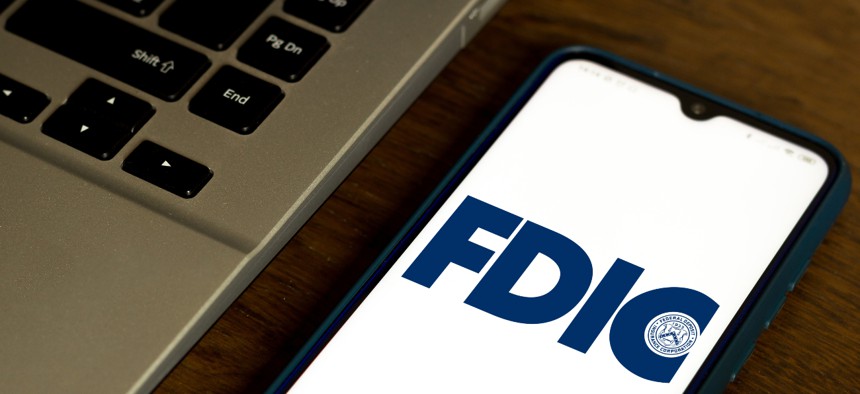
NTEU Chapter 207 represents employees at FDIC headquarters in the Washington, D.C., region. Rafael Henrique/SOPA Images/LightRocket via Getty Images
FDIC Is Already Reneging on Its New Telework Agreement, Union Says
The National Treasury Employees Union said employees were promised telework with no need to return to the office regularly, only for managers to make attendance at weekly check-in meetings mandatory.
A union representing employees at the Federal Deposit Insurance Corporation said the agency is reneging on a telework agreement it inked just months ago by requiring full-time teleworkers to come in for newly mandatory “check-in” meetings.
During the pandemic, the National Treasury Employees Union and the FDIC entered negotiations on how to expand telework, eventually signing a new deal in January. That deal offered employees the choice of three tiers of telework: ad hoc, where employees could work remotely for a day or two as needed; extended telework, where workers can telework at least five days per biweekly pay period; and the home-based option, where employees would be able to work nearly entirely from home, save for days when a manager can call them in for a mandatory in-office function.
A fourth option: fully remote work, also was negotiated, but union officials said that is primarily for bank examiners, who work mostly at financial institutions, not agency offices.
Vivian Hwa, president of NTEU Chapter 207, which represents employees at FDIC headquarters in the Washington, D.C., region, said fully 80% of the agency elected the home-based option earlier this year. But last month, as agency leaders prepared to enter the final phase of its return to office plan, they changed their tune, stressing the importance of in-person collaboration and scheduling mandatory in-person meetings on a regular basis, seemingly in violation of at least the spirit of the new telework agreement.
“For the most part, you could work from anywhere, in office or out of the office, it was your choice,” Hwa said. “We agreed to it, but now they’ve decided, ‘No, we want you in the office on a regular recurring basis.’ They started coming up with business justifications, like team building, and it turned into people basically inventing biweekly meetings so that they would come in at least once per pay period. It’s a backdoor way to get rid of the home-based option.”
In response to the dispute, NTEU filed a national grievance against the agency, which is now headed to arbitration. But officials with the FDIC said they believe requiring employees to come in on a regular basis is "consistent" with the agreement they signed with the union in January.
"We have established a robust and flexible telework program for our workforce but are mindful that the benefits of in-person activities cannot be obtained solely through remote work," the agency said in a statement. "To balance these flexibilities, we believe that requiring employees to attend in-person meetings and events to meet mission, staffing and workload requirements at least one day every two weeks is reasonable and consistent with the telework options our employees have elected."
Hwa said employees are frustrated because the meetings that are now mandatory were regular meetings that were held successfully via Zoom throughout the pandemic, and weren’t mandatory before the pandemic.
“They’re just making us come into the office when we don’t need to, and making us pay the price of that commute, just to be a warm body in a building for no practical reason,” she said. “That’s why there’s such an uproar and people are so upset.”
Hwa stressed that FDIC employees are not opposed to reporting to agency offices when it’s actually needed. They are just angered that management has reversed course on a benefit they had already begun offering and implementing for workers.
“The big word has been ‘trust,’ it’s just a loss of trust,” she said. “FDIC sat down and said, ‘Here’s what I offer you and here’s what we mean by it,’ and then they turned around and undid it in a sneaky way. If you just said there’s no such thing as the home-based option and everyone has to come in three times a pay period or one time a pay period and we’ll pay for your commute on those days, fine, at least that’s something that’s negotiable . . . But the fact is you discussed this and agreed to it and then you undid it on your own—that’s why we’re upset.”







